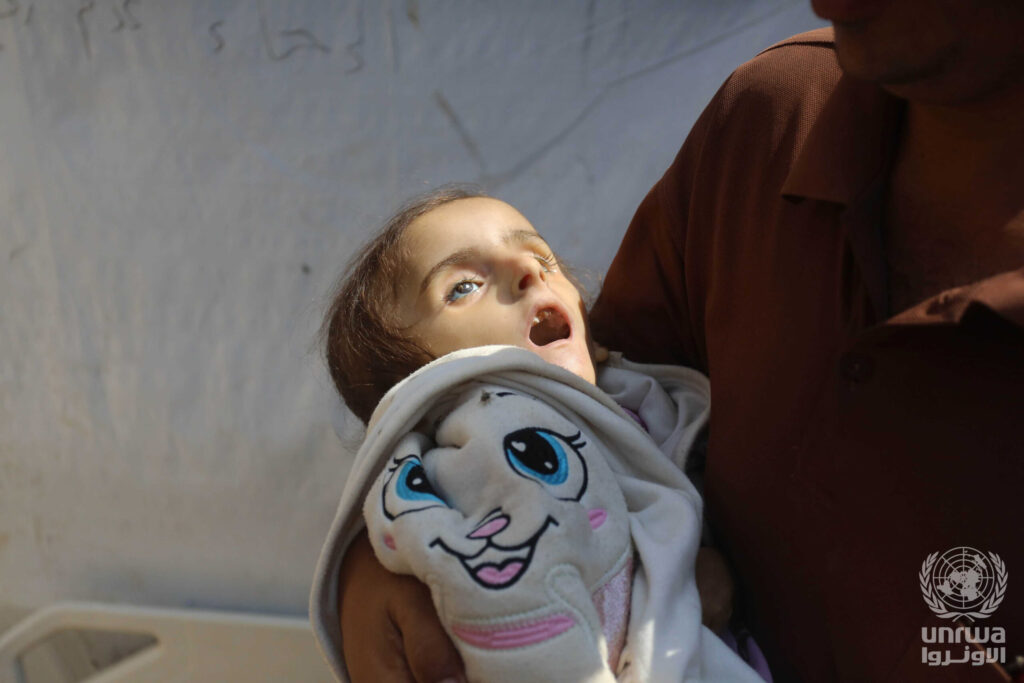Opinion: Gaza: What Have We Become?

A 4-year-old Palestinian girl, lost her life due to malnutrition and lack of treatment due to the war on Gaza. Photo: Ashraf Amra / Wikimedia Commons (CC BY-SA 4.0)
by Rabbi Devorah Jacobson and Jeffery Gold (.with co-signers: Tom Weiner, Sara Weinberger, Leslie Schwartz Leff and John Reiff)
In her powerful Daily Hampshire Gazette column on July 21, Sara Weinberger describes her moral outrage and deep grief for the horrors our immigrant neighbors are facing in this country. She asks a question that speaks to our hearts and might awaken our moral conscience: As a nation, she writes, “What have we become?”
As Weinberger noted, August 3 is Tisha b’Av, the 9th day of the month of Av in the Jewish calendar, a day on which Jews remember not only the destruction of the 1st and 2nd temples in Jerusalem and the centers of Jewish life, but the exile from Spain and other atrocities perpetrated against them. Just as sje connects this day of grief to the atrocities being committed against immigrants in this country, so do we want to connect this day to a different crisis that we also grieve and which causes us profound moral distress: the destruction of Gaza. Indeed, the same question Sara raised should be asked: If we are Jewish, What have we become? If we are humanists, or people of other faith traditions or none, what have we become? If we are Americans, what have we become?
Until recently, the mainstream press has almost abandoned coverage of these atrocities committed by the Israeli government/army, and bankrolled by the United States. Despite the urge to look away, the fact is that we are witnesses to these horrors in real time: tens of thousands dead, huge numbers of child amputees, the total destruction of societal infrastructure and, most critically, Gaza’s healthcare system and hospitals. Finally, Israel has engaged in the horrific use of starvation as a weapon of war. On July 24, the editorial staff of the Israeli newspaper Haaretz wrote: “Gaza is starving, and Israel is responsible.”
We are members of a local group, Bridging the Divide Coalition, comprised of Palestinians, others of Arab/Muslim descent, Jews, and a Euro-American raised Christian. For each of us, the group has become “a network of solidarity.” We have struggled to find each other, overcome our fears, share our personal stories, and develop bonds of trust and friendship. While the Israel/Palestine conflict long pre-dates October 7, 2023, the tragedy and the trauma of Hamas’ horrific attacks on Israel shook the Jewish psyche. The Israeli response was not in our view one of defense, but rather one whose intent was obliteration throughout Gaza.
For those of us who are Jews and believe in Jewish safety and Palestinian freedom, we have watched this devastation unfold for almost 21 months. Many now agree this is a genocide. We grieve and we wonder how this mass killing, starvation, and displacement will ever end. Our relationship to Israel is complex. And yet we have come to acknowledge the painful truth that Israel, a place many of us have loved, lived in and supported for generations, has lost its post-Holocaust claim to a moral high ground. It has rather become, in author Amy Kaplan’s words, the “invincible victim,” proclaiming its exceptionalism on the one hand and thereby justifying its actions, while simultaneously denying and refusing to acknowledge – or be accountable for – the dehumanization of a people.
Last week our group met to discuss the new book by Omar El Akkad, One Day Everyone Will Have Always Been Against This. It is a powerful, shattering book, both a memoir and a devastating critique of US and Western complicity in the war against the Palestinian people.
Akkad writes about courage and the value of movements of protest. Yet there are days when protest feels pointless. He writes: “What use is any of it, what use? But there IS a use, always. The first is outward: every derailment of normalcy matters when what’s becoming normal is a genocide… The second is inward: every small act of resistance trains the muscle used to do it…and having called for justice in one instance, one might do it again and again, might call for a just world.”
Understood in this way, Tisha b’Av is both a day for remembering particular Jewish tragedies, as well as looking outward to respond to current moral urgencies. It should be about our grief regarding the suffering in Gaza in real time and our moral culpability. So that maybe, that grief will become in time an opening to courage, and a goad to action.
Please consider donating to: Gaza Soup Kitchen (https;//Gazasoupkitchen.com) or World Central Kitchen (wck.org).
Rabbi Devorah Jacobson is a resident of Hadley. Jeffery Gold is a resident of Pelham.

Religion has to be held accountable as a way of justifying aggression. There are many other ways such as patriotism, exceptionalism, nationalism, christian nationalism (Trump’s favorite), racism, etc., to do that, but the idea that there is a god and that it (whatever “it” supposedly is) is on our side has a very long and ugly history, and is arguably responsible for the worst amount of inter-group harm in the world today. At the very least, why invoke it as some badge of honor for doing the right thing, which only promotes it’s negative usage?
The unfortunate truth appears to be that it’s in Netanyahu’s interest to continue the war to stay out of prison. At the same time there aren’t enough Israeli votes for peace and a two-state solution to bring about a change in government. Alas, I don’t think there is anything USA citizens can do to affect Israeli politics despite my abhorrence and the values I was taught in Sunday school in the 1940s.